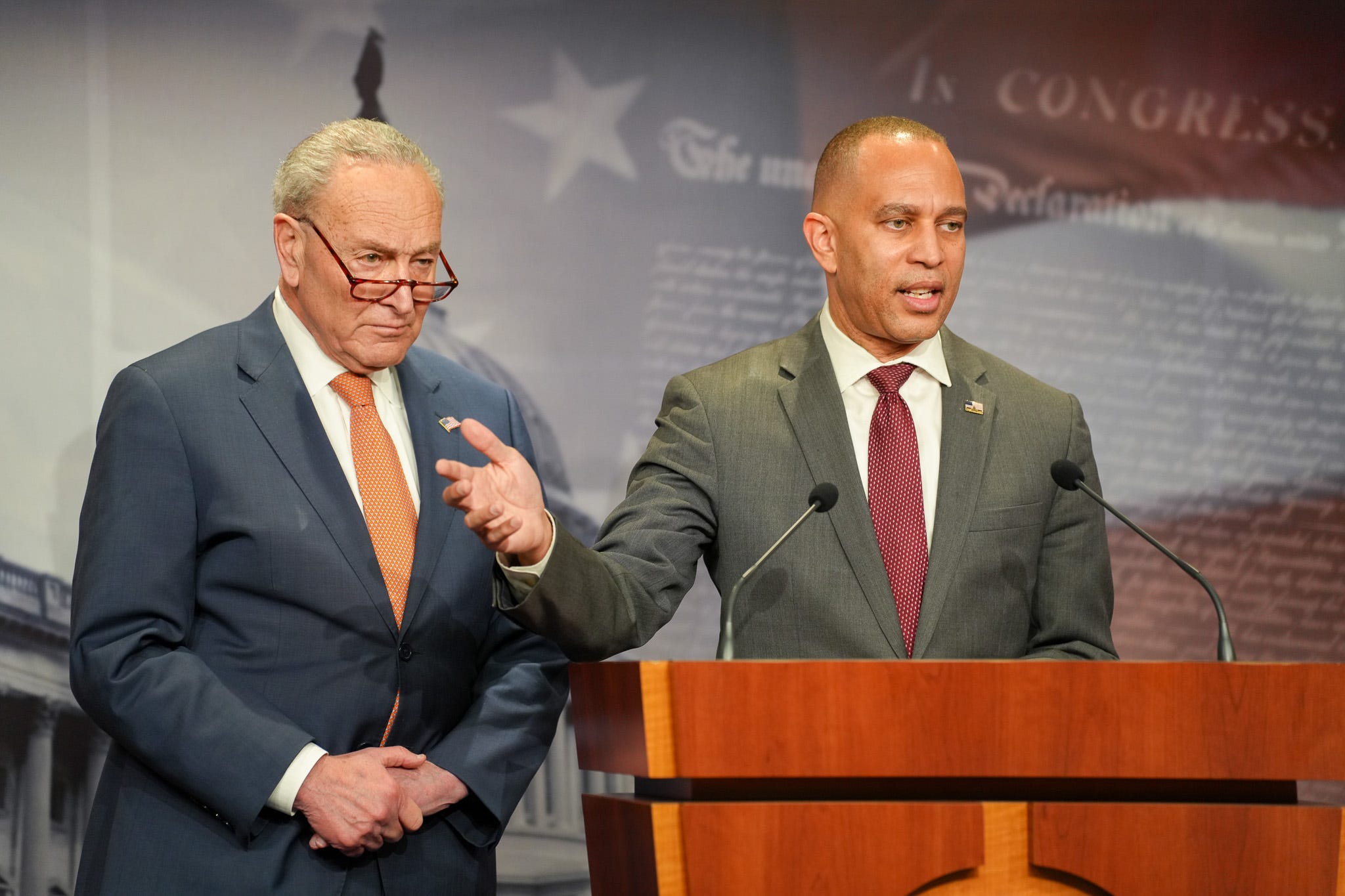Jeffries and Schumer draw a line on health care as Democrats demand a broader fight
Rank-and-file Democrats want concessions on everything from rescissions to Medicaid. Party leaders are channeling the fight into one issue: protecting Americans’ health care.

House Democrats are spoiling for a fight as government funding talks drag on. In an at-times tense caucus meeting this week, rank-and-file members pressed for substantial concessions and urged their leaders to prove to the Democratic base they’re willing to go to the mat against President Donald Trump.
But Senate Majority Leader Chuck Schumer (D-N.Y.) and House Minority Leader Hakeem Jeffries (D-N.Y.) seem to have a narrower objective.
Both leaders are steering the confrontation toward healthcare with a warning that millions of Americans will see their costs soar if Republicans refuse to extend Affordable Care Act premium tax credits and reverse cuts from the reconciliation bill the GOP passed this summer.
It’s a message aimed less at checking every member’s wish lists than at unifying Democrats around an issue with broad public resonance and making Republicans own the consequences if they refuse.
“This would be a nightmare scenario for the American people: On October 1st, getting notice that your healthcare costs will go up 18 percent,” Schumer said on the Senate floor this morning. “Especially for the millions who are on ACA at a time of rising costs, as you are seeing, and at a time of a weakening job market.”
Jeffries also focused much of his attention at his weekly press conference this morning on health care and the looming cliff created by expiring ACA premium subsidies and Medicaid cuts.
“Republicans have broken our healthcare system and unleashed the unfortunate and painful reality that millions of Americans are about to experience dramatic increases in their healthcare premiums, co-pays and deductibles,” he said. “We will not support a partisan Republican spending bill that continues to rip away healthcare from the American people.”
Schumer and Jeffries, alongside their leadership team and top appropriators, will meet this afternoon to discuss the path forward.
“I expect that coming out of the meeting, you’ll continue to see a strong and unified position,” Jeffries said, while declining to comment on whether he would meet with Speaker Mike Johnson (R-La.). “I look forward to continuing to advance the ball where possible, but we have made clear we’re ready to support a bill that is bipartisan in nature.”
He did not commit to a meeting with President Trump.
“That remains to be seen.”
A source in the House Democrats’ caucus meeting described the irritation some members expressed as directed at leadership rather than member-on-member friction. According to the source, the issue is about having a clear message and being direct with Schumer that they want clear, concrete demands they can point to in negotiations.
“The people don’t care about process. They care about Democrats fighting. Members want to be able to say they want X and it is or is not in the package,” the source said. “X needs to be specific and understandable. Americans want a president who will not take any more money through clawbacks and rescissions. Will they agree? Will they obey? That is a specific.”
The source familiar with Jeffries’ thinking acknowledged that Jeffries is attuned to the sentiment among House Democrats that he must “fight” the Trump administration and congressional Republicans in the negotiations. At the same time, they noted the inherent challenge: With 209 caucus members, excluding his top deputies, House Minority Whip Katherine Clark (D-Mass.) and House Democratic Caucus Chair Pete Aguilar (D-Calif.), there are just as many opinions about what fighting should look like, complicating efforts to present a unified front.
I asked Jeffries how he is navigating the array of demands within his caucus—from members pushing for anti-impoundment language or a ban on rescissions, to those saying health care alone should be the red line, to others simply wanting a clean short-term funding extension—and he said that healthcare is a unifying issue.
“I believe that all of us are ready to continue the fight and health care being right at the top of that list. But the fight, of course, is about all of the things, all of the extremism, the parade of horribles that Donald Trump has unleashed on the American people and their failed promises to make life more affordable.”
The Affordable Care Act’s premium tax credits are designed to make health care insurance purchased on the marketplace more affordable for low- and middle-income Americans. They work by capping the percentage of income households are expected to contribute toward premiums, with the federal government covering the rest.
The American Rescue Plan in 2021 and later the Inflation Reduction Act in 2022 temporarily expanded these credits, both by increasing the size of the subsidies and by eliminating the so-called “subsidy cliff” that cut off assistance for people earning just above 400 percent of the federal poverty level. Those enhanced subsidies led to record marketplace enrollment and helped keep premiums stable for millions of people.
Unless Congress acts, however, the expansions are set to expire at the end of 2025, which would raise costs for many enrollees and potentially cause some to drop coverage altogether. Democrats have increasingly framed extending the enhanced credits as both a health care affordability measure and a political imperative heading into the 2026 midterms, while Republicans have generally opposed making the temporary provisions permanent due to their cost and the broader fight over federal health care spending.
Then there’s the One Big Beautiful Bill Act, the sweeping reconciliation package passed earlier this year by congressional Republicans and signed by President Trump, which included significant cuts to Medicaid that Democrats have since made a central flashpoint.
The legislation reduced federal Medicaid funding by tightening eligibility rules, phasing out enhanced coverage options adopted during the COVID-19 pandemic, and imposing new work requirements for certain adults. It also rolled back incentives for states that expanded Medicaid under the ACA, effectively penalizing those that chose to broaden coverage.
Republicans framed the changes as necessary to rein in federal spending and encourage workforce participation, but Democrats warn they will translate into millions of Americans losing health coverage, especially in vulnerable communities, and put additional strain on hospitals and state budgets.
The cuts have become a rallying cry for rank-and-file Democrats, many of whom argue that reversing them should be a top demand in the current government funding negotiations.
Democrats have also pointed to the 2026 Republican funding bill for federal health care programs and agencies as evidence of a continued GOP assault.
The legislation eliminates funding for maternal health services and contraception, while adding divisive riders related to abortion. Democrats characterize these as poison pills that politicize access to reproductive health care.
The bill imposes steep cuts to biomedical and public health institutions, slashing support for the National Institutes of Health as well as the Agency for Healthcare Research and Quality. Funding is reduced for the CDC, HIV/AIDS initiatives and mental health programs, which opponents warn will weaken national preparedness for future health crises.
“I believe that all of us are ready to continue the fight and health care being right at the top of that list,” Jeffries said. “But the fight, of course, is about all of the things, all of the extremism, the parade of horribles that Donald Trump has unleashed on the American people and their failed promises to make life more affordable.”
Health care was the dominant issue of the 2018 midterms, when Democrats flipped the House by hammering Republicans over their repeated attempts to repeal the Affordable Care Act and weaken protections for people with preexisting conditions.
Polling at the time consistently showed health care as voters’ top concern, and Democrats leaned into personal stories of constituents who relied on the ACA’s coverage. The strategy paid off in suburban swing districts and helped build the party’s largest House majority in a decade.
The political environment today has striking similarities. Republicans once again control both chambers of Congress and the White House, and Democrats are in the minority pressing to protect health care gains. Party strategists are increasingly bullish that health care could once again be a defining wedge in the midterms.
Open enrollment for ACA coverage begins November 1, meaning insurers will start notifying families within weeks if subsidies aren’t extended. Those notices would land just as the government funding fight peaks and likely create panic over rising premiums months before the official December 31 expiration. Leaders argue that acting now is the only way to prevent a sudden spike in costs from becoming a political and human crisis.
“This is one of many issues that should be addressed urgently by the United States Congress in terms of making sure we stop the effort to continue to rip healthcare away from the American people and lean into an effort to actually protect the healthcare of the American people,” Jeffries said. “And that includes, but is not limited to, addressing the tax subsidy issue with respect to the Affordable Care Act.“



